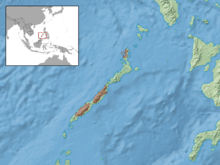Dasia griffini
Dasia griffini, commonly known as Griffin's keel-scaled tree skink or Griffin's dasia, is a species of tree skink, a lizard in the family Scincidae. The species is endemic to central and northern Palawan and southern Mindoro in the Philippines.[1][2][3]
| Dasia griffini | |
|---|---|
| Scientific classification | |
| Kingdom: | Animalia |
| Phylum: | Chordata |
| Class: | Reptilia |
| Order: | Squamata |
| Family: | Scincidae |
| Genus: | Dasia |
| Species: | D. griffini |
| Binomial name | |
| Dasia griffini Taylor, 1915 | |
 | |
Etymology
The specific name, griffini, is in honor of American herpetologist Lawrence Edmonds Griffin (1874-1949).[4]
Behavior and habitat
Dasia griffini is an arboreal lizard. It is found on tree trunks or aerial ferns 7 to 28 metres (23 to 92 ft) above the ground. It inhabits dipterocarp primary forests. More rarely, it is also found in coastal forests and scrubland.[1]
Taxonomy
Dasia griffini belongs to the genus Dasia.[5] It is classified under the subfamily Mabuyinae of the skink family Scincidae.[2]
Conservation status
Dasia griffini is threatened by logging activities in its habitats.[1]
References
- Brown, R.; Dimalibot, J. & Rico, E.L. (2009). "Dasia griffini". IUCN Red List of Threatened Species. 2009: e.T169806A6676223. Retrieved 14 August 2020.
- Dasia griffini at the Reptarium.cz Reptile Database. Accessed 14 August 2020.
- Siler, Cameron. "Known distribution of Dasia griffini in the Philippines". Biodiversity Research & Education Outreach, Philippines. Archived from the original on 2012-04-25.
- Beolens, Bo; Watkins, Michael; Grayson, Michael. (2011). The Eponym Dictionary of Reptiles. Baltimore: Johns Hopkins University Press. xiii + 296 pp. ISBN 978-1-4214-0135-5. (Dasia griffini, p. 108).
- Inger, Robert F & Brown, Walter C. (1980). "Species of the scincid genus Dasia Gray". Fieldiana Zoology. New Series. 3: 1–11. doi:10.5962/bhl.title.3190.
Further reading
- Taylor EH. (1915). "New Species of Philippine Lizards". Philippine J. Sci. 10: 89-109 + Plate I. (Dasia griffini, new species, p. 104 + Plate I, figures 5 & 6).
